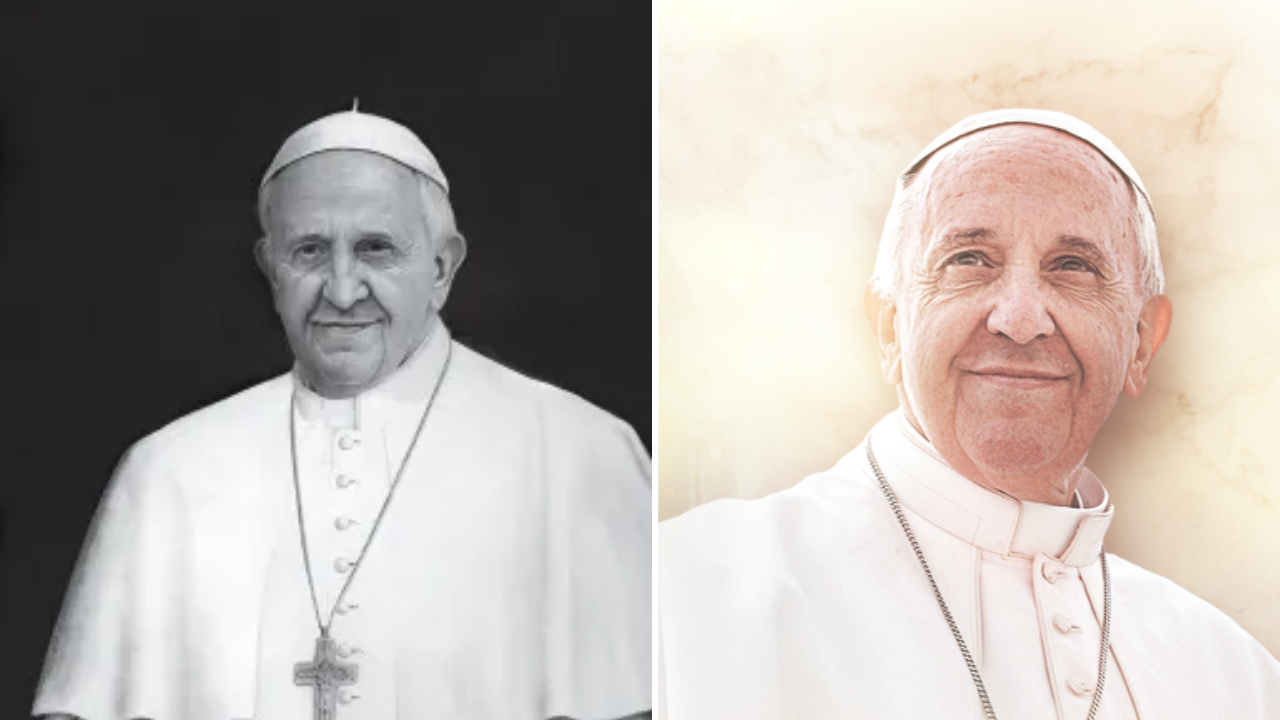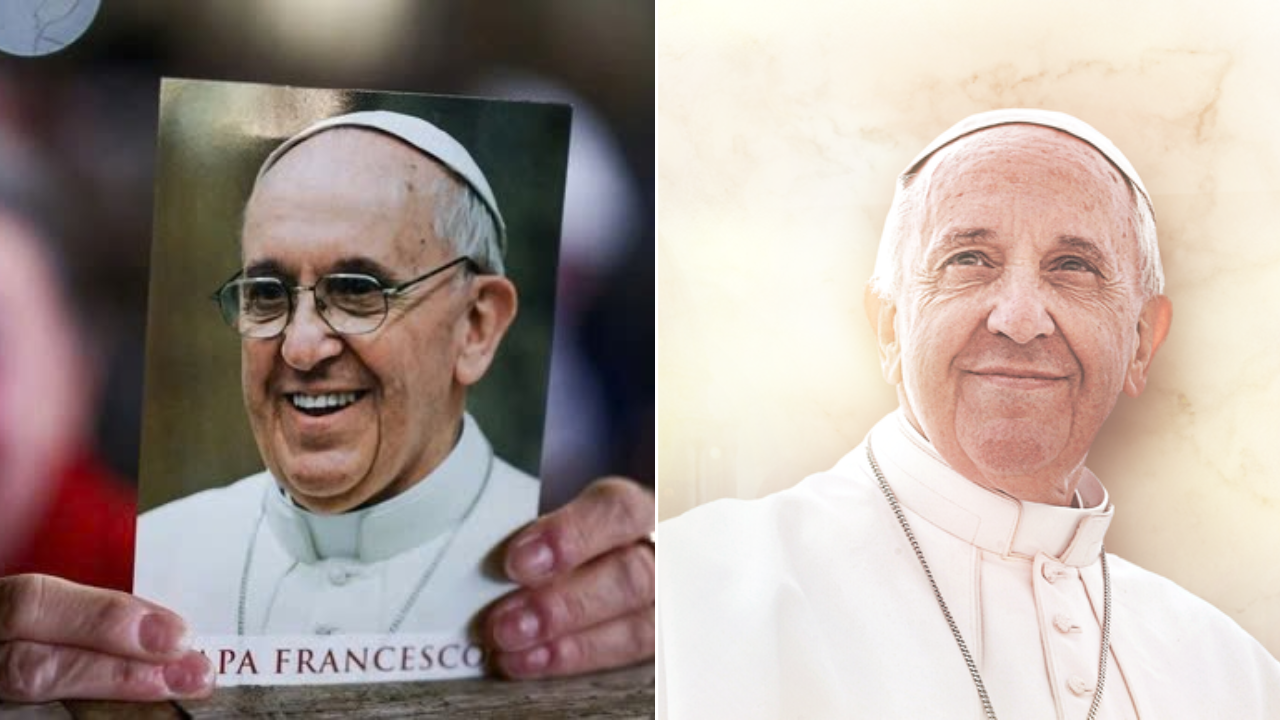Pope Francis, born Jorge Mario Bergoglio, assumed the papacy in 2013 following the resignation of Pope Benedict XVI
:max_bytes(150000):strip_icc():focal(725x419:727x421):format(webp)/Pope-Francis-120824-1-bfb0a5d45f5f46e1934fab8de6f8e91e.jpg)
Pope Francis. Photo:Antonio Masiello/Getty
- Pope Francis died on Monday, April 21, at the age of 88
- Vatican News said the Pope died at his residence in the Vatican’s Casa Santa Marta
- Born Jorge Mario Bergoglio in Buenos Aires, Argentina, Francis made history as the first pope from the Americas, the first Jesuit pope and the first pope since the eighth century not to be from Europe
Pope Francis, the head of the Catholic Church and leader of the world’s approximately 1.3 billion Catholics, has died. He was 88.
The Pope, who has battled a number of health issues over the years, died a month after he was discharged from the hospital, where he was treated for double pneumonia, following a 38-day stay.
Vatican News confirmed his death in a post on X, “Pope Francis died on Easter Monday, April 21, 2025, at the age of 88 at his residence in the Vatican’s Casa Santa Marta.”
His death came a day after his meeting with U.S. Vice President, J.D. Vance.
On Feb. 14, the Vatican confirmed that the pontiff had been hospitalized at the Agostino Gemelli Polyclinic Hospital in Rome. Initially treated for bronchitis, he developed double pneumonia and his condition worsened over the next two weeks, although there were several days where the Vatican reported slight improvements.
An audio recording of the pope thanking people for their prayers was released on March 6. Although the Vatican did not offer many details, they said it was recorded from the hospital.
“I thank you with all my heart for the prayers you offer for my health from [St. Peter’s] Square. I accompany you from here,” he said in a message recorded in Spanish, Francis’ native tongue. “May God bless you, and may the Virgin protect you. Thank you.”
Although still hospitalized at the time, Thursday, March 13, marked a major milestone for Francis: the 12th anniversary of his papacy. To celebrate, that afternoon a cake with candles was brought to his room, according to the Vatican.
:max_bytes(150000):strip_icc():focal(689x279:691x281):format(webp)/pope-francis-2-5ff7ff8684814c52a6e11f8240238688.jpg)
Pope Francis. Dan Kitwood/Getty
Francis, who had part of one of his lungs removed when he was younger, sought treatment for bronchitis a number of times throughout his life.
The late pontiff has experienced other health concerns in the past, including undergoing colon surgery in June 2021 — and he previously opened up about nearly dying from the flu at age 21, according to his book Let Us Dream: The Path to a Better Future, in which he also wrote about navigating the COVID-19 pandemic.
“When I got really sick at the age of twenty-one I had my first experience of limit, of pain and loneliness. It changed the way I saw life,” he wrote. “For months, I didn’t know who I was, and whether I would live or die. The doctors had no idea whether I’d make it either.”
Born Jorge Mario Bergoglio, Francis made history upon his 2013 appointment to the papacy as the first pope from the Americas, the first Jesuit pope and the first pope since the eighth century not to be from Europe.

Unlike many of his predecessors, he chose not to live in the papal apartments of the Apostolic Palace but rather in the Domus Sanctae Marthae guesthouse, as it, in part, allowed him to “live in community with others,” according to the Catholic News Service.
“The very decision to live differently rather than in the traditional place immediately got rid of all [the] intermediaries,” biographer Austen Ivereigh tells PEOPLE. “People were really furious early on. They really, really resented it.”
Ivereigh says that according to Francis, there was another group of people who weren’t happy with him in Rome at the time: clerical tailors. “His new vibe of simplicity made others conscious of it, so suddenly all the clergy stopped wearing the more elaborate collars and such. I think a cardinal was even heard saying that “simplicity is the new chic,’ ” says Ivereigh.
In fact, Ivereigh says that “for a couple weeks after being appointed pope,” Francis kept “wearing his usual dark trousers underneath his white cassock.”
“And they said to him, ‘You really ought to be wearing white trousers.’ And he said, ‘Don’t be ridiculous, I’m not an ice cream seller,’ ” adds the author.
:max_bytes(150000):strip_icc():focal(1019x385:1021x387):format(webp)/pope-francis-2-2000-79ca3d21faa642eb8f115573f82ea09c.jpg)
Pope Francis. AYMAN HENNA/AFP via Getty
Throughout his lifetime, Francis navigated the papacy with a special focus on humility and helping the poor; he often repeated the phrase, “My people are poor and I am one of them,” according to his Vatican biography.
Francis was born in Buenos Aires on Dec. 17, 1936 to Italian immigrant parents Mario, an accountant, and Regina Sivori, a housewife who tended to the family’s five children, per his Vatican biography.
He held a variety of jobs — including janitor and nightclub bouncer — before graduating as a chemical technician and deciding to become a priest, according to The Los Angeles Times.
He studied in Chile and Argentina and later earned a degree in theology from San Miguel’s Colegio de San José after briefly teaching literature and psychology at Immaculate Conception College in Santa Fe, New Mexico, and Colegio del Salvatore in Buenos Aires.
After becoming ordained as a priest in 1969, he spent the next decades in various positions before becoming the Archbishop of Buenos Aires in 1998.
:max_bytes(150000):strip_icc():focal(999x0:1001x2):format(webp)/pope-francis-161203-2000-d4d42626027d4ef5945be52378ed526f.jpg)
Pope Francis.
Pope John Paul II made him a Cardinal in 2001, and “he asked the faithful not to come to Rome to celebrate his creation as Cardinal but rather to donate to the poor what they would have spent on the journey,” according to his biography.
He was elected pope in March 2013 following the shocking resignation of Pope Benedict XVI one month earlier.
His biographer tells PEOPLE that Francis had a “phenomenal work ethic,” although it would be wrong to categorize him as a “workaholic.”
“That’s been true of him for decades. People who work with him say he hasn’t taken a holiday since the 1970s,” Ivereigh adds.
On a typical day, Francis would get up at 4 a.m. “and spend two hours in prayer, in silent meditation.”
“Then he would have morning Mass at seven o’clock, and then breakfast. In the morning, most days he would have all his formal meetings, that could be the official meetings with heads of state and so on,” he continues, noting that Francis typically kept afternoons free for even more meetings.
:max_bytes(150000):strip_icc():focal(737x539:739x541):format(webp)/pope-Francis-1-a32eea977ae64c07ab849f1f4639d6c4.jpg)
Pope Francis. ANGELO CARCONI/POOL/AFP via Getty
Francis was known for voicing views that sometimes clashed with those of the Catholic Church, like when, in a 2020 documentary, he declared his support for same-sex civil unions.
“What we have to create is a civil union law. That way they are legally covered,” he reportedly said in the documentary Francesco, according to the New York Times and Washington Post. “I stood up for that… They’re children of God and have a right to a family. Nobody should be thrown out or be made miserable because of it.”
However, his tenure was not without controversy. In the later years of his papacy, he was repeatedly accused of using a homophobic slur, which at one point prompted an apology from the Vatican.
“As he has had the opportunity to say on several occasions: ‘There is room for everyone, for everyone in the Church! No one is useless, no one is superfluous, there is room for everyone. Just in the way that we are, all of us,’ “ spokesman Matteo Bruni told PEOPLE in May 2024. “The Pope has never intended to offend or express himself in homophobic terms, and he apologizes to those who have felt offended by the use of a term, reported by others.”

His handling of the multiple sex abuse scandals plaguing the Catholic Church was also widely discussed, including in 2016 when he said there was “not a single proof” that Juan Barros, a bishop, had covered up abuse by Father Fernando Karadima, a Chilean priest.
Francis later apologized while standing by Barros — saying he believed he was “innocent” — and acknowledged that his supporting Barros must have come across as a “slap in the face” of Karadima’s victims, the Washington Post reported.
In 2020, Francis vowed to rid the Catholic Church of sexual abuse. “I renew my closeness to victims of any abuse and commitment of the church to eradicate this evil,” he said.
Never miss a story — sign up for PEOPLE’s free daily newsletter to stay up-to-date on the best of what PEOPLE has to offer, from celebrity news to compelling human interest stories.
Speaking to Francis’ leadership style, his biographer tells PEOPLE that Francis typically took a “long time” to make important decisions — but that once his mind was made up “he’s like a bulldozer.”
“He’s a strange mixture — he has tremendous authority, and when you’re with him, you feel his authority. But it’s a gracious authority,” Ivereigh explains. “He always makes you feel… it’s not the kind of authority that diminishes you. He creates space for you, and makes you feel seen and recognized. A lot of people say that about him. It’s quite a remarkable trait.”
— with additional reporting from Alina Trabattoni and Kirsty Hatcher

